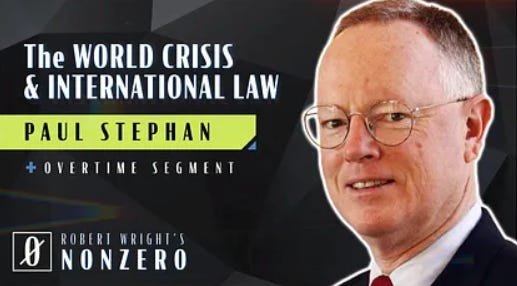Earthling: TikTok and AI meet Cold War II
Plus: Controversial weapons week, new crime: “climate homicide,” the hazards of humiliation, paid subscriber perks, and more!
This week the AI arms race heated up, as Google released Bard, its rival to OpenAI’s ChatGPT and Microsoft’s GPT-powered Bing Chat. In related news: the list of journalists who share this newsletter’s anxiety about possible downsides of AI grew by at least one.
Sigal Samuel of Vox made the case that “AI threatens to join existing catastrophic risks to humanity, things like global nuclear war or bioengineered pandemics.” Samuel also proposed that we do something about this: “While there’s no way to uninvent the nuclear bomb or the genetic engineering tools that can juice pathogens, catastrophic AI has yet to be created, meaning it’s one type of doom we have the ability to preemptively stop.” So maybe “instead of racing to speed up AI progress, we could intentionally slow it down.”
Maybe. But one thing that makes it hard to slow down the AI arms race is… the AI arms race. Constraining technological evolution is inherently hard, and it gets harder once you’ve got several big companies competing for dominance while smaller companies nip at their heels.
And it gets really, really hard when any of those companies can point to a feared foreign power that may outcompete them all if the rest of us don’t shut up and get out of the way. Samuel herself highlights this problem, recounting what an unnamed Microsoft executive said when she “asked whether the US should slow down AI progress. I was told we can’t afford to because we’re in a two-horse race between the US and China.” The executive said, “This should be looked at much in the way that the competition with Russia was looked at [during the Cold War].”
Add this to your list of possible downsides of AI: It will give big tech companies an incentive to keep us in a state of fear—an incentive that for decades has led arms manufacturers to fund fear-mongering think tanks and politicians and in various other ways distort our discourse.
This isn’t a wholly new incentive in Silicon Valley. Microsoft, Amazon, and other big tech firms have long sought Pentagon contracts. But as AI grows in power and scope, the parts of it that will be deemed vital to American interests will go well beyond the (ample) battlefield applications. So expect other American AI powers to join Microsoft in encouraging a Cold War mentality.
And, for that matter, expect that from American social media powers. As the Wall Street Journal reported, the push to ban the Chinese-owned social media app TikTok is getting support from a group called the Hill & Valley Forum, funded with Silicon Valley money. On the eve of yesterday’s congressional testimony of TikTok CEO Shou Zi Chew, the group hosted a 200-person dinner featuring congressional notables and tech potentates. “We’re priming Congress to be ready for this testimony,” said former Google policy advisor Jacob Helberg, who the Journal said is “spearheading the effort to create the bipartisan, bicoastal alliance of China hawks.”
The question of what, if anything, to do about TikTok is a complex one, best pondered in an atmosphere of calm objectivity. That was not the atmosphere that prevailed at yesterday’s grilling of Shou by members of Congress. Which isn’t surprising given that Helberg, who helped “prime” some of them, asserts that TikTok is “the most potent espionage operation that China has ever carried out against the US,” notwithstanding the absence of evidence to support that claim.
As for AI: Even if we weren’t descending into a new Cold War, significantly slowing its rate of advance would be forbiddingly hard. Still, it would be good for humankind if there could at least be a meaningful global dialogue about its many risks. But the only risk the Biden administration seems to take seriously is that China could use AI to triumph in the Manichaean struggle between democracy and autocracy that, according to the Biden administration, we’re in. Hence Biden’s draconian restriction on the export of advanced microchips and chip making equipment to China, a move that has deepened the Cold War and so made meaningful global dialogue even less likely than it was before (and that some observers say will ultimately prove counterproductive).
Which means it’s going to be that much harder to address not just the dangers of AI but the comparable threats Samuel mentioned, in the realms of nuclear and biological war—to say nothing of the threat of an arms race in space, in cyberspace, and so on.
Silicon Valley China hawks warn that China could use TikTok to shape American opinion. That’s true in principle—and rationally evaluating TikTok’s proposals to prevent that in practice would be nice, if only our politicians would calm down long enough to rationally evaluate anything.
It’s also true in principle that American tech companies can use their control of big social media platforms and search engines—and, increasingly, AI—to shape American opinion. If they shape it in accordance with the views of the Hill & Valley Forum, TikTok could turn out to be the least of our worries.
Attention paid subscribers! This week we bring you the following exclusive content:
Bob’s conversation with NZN staffer Andrew Day about this week’s Earthling items. You can access that conversation here or look for it (and the other two perks) in your paid subscriber podcast feed.
New audio essays that you can listen to here. The original essays—“Another reason to take the lab-leak hypothesis seriously” and “Ok, it’s time to freak out about AI”— can be found here and here.
Early access to Bob’s conversation with law professor Paul Stephan about global crises and the limits of international law in resolving them.
Could panic about a possible Chinese invasion of Taiwan make an invasion more likely? In Foreign Affairs, political scientist Jessica Chen Weiss argues in the affirmative.
What leaders in Washington see as deterrent acts—pledging to defend Taiwan if China invades, beefing up military aid, etc.—Chinese leaders may see as provocations, writes Weiss. And China’s responses to such provocations—shows of military force, defiant rhetoric—can raise tensions by strengthening the belief in Washington that invasion is likely unless more action is taken soon.
That belief is mistaken, says Weiss, and arguments used to support it are flawed. For example, some western analysts fear China could launch a war to distract its citizens from domestic troubles. But historically, China’s home-grown challenges have pushed Beijing to moderate its foreign policy and focus on internal matters.
The US should focus on stopping “the action-reaction spiral that has steadily ratcheted up tensions and made a crisis more likely,” Weiss writes; otherwise America’s alarmism could make the invasion a “self-fulfilling prophecy.”
The congressional rush to demonize TikTok wasn’t totally unanimous, as noted by Tobita Chow, Director of Justice Is Global, in NZN’s tweet of the week:








